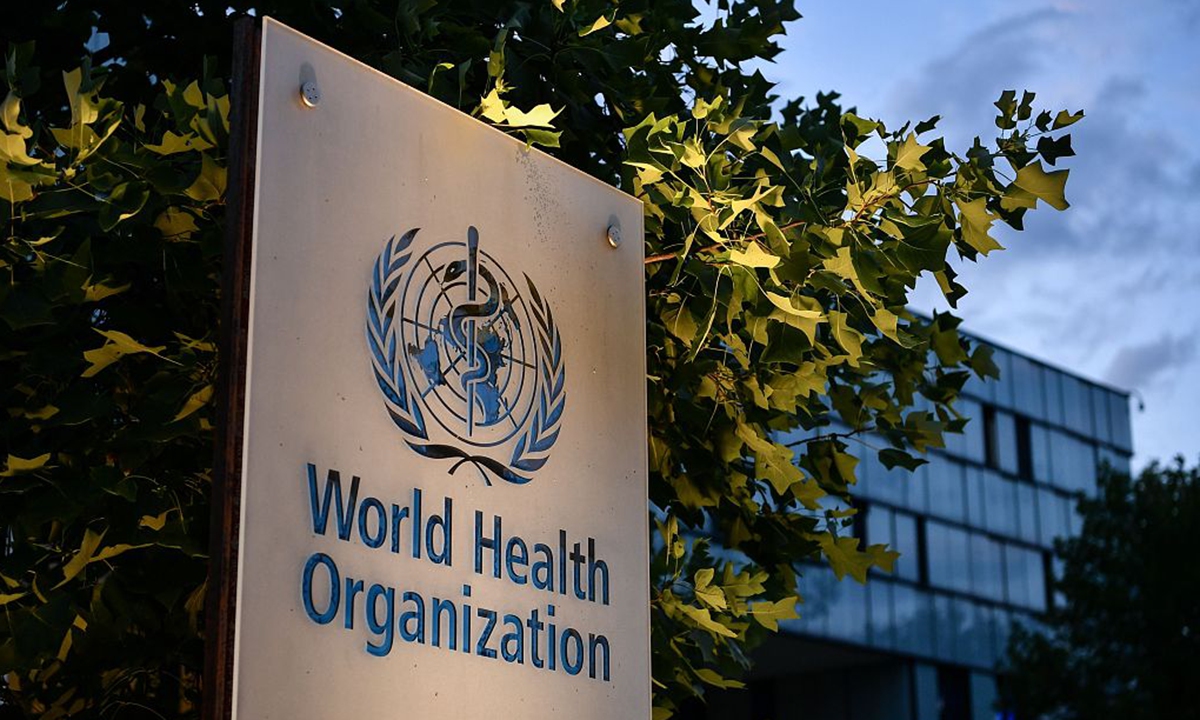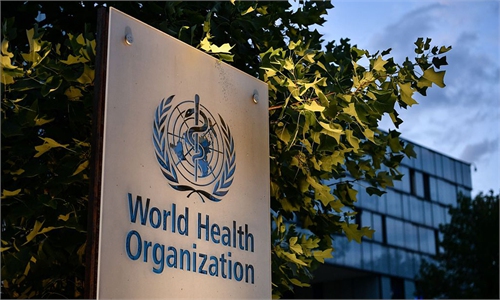More evidence supports multiple virus origins
CAS pre-print paper finds India likely birthplace of the virus, yet far from drawing a conclusion

WHO. Photo: VCG
More evidence and academic studies exploring the origin of the novel coronavirus have emerged, pressing the international community to review the issue and strengthen global cooperation, experts said Sunday after WHO officials reached out to researchers in Italy to investigate the virus origin and a Chinese study hinted that the human-to-human transmission may have started in India months before the outbreak in Wuhan.All countries need to devote efforts into tracking the virus origin because multiple theories are backing the idea that novel coronavirus may have existed in multiple places before being spotted in Wuhan, Chinese experts reached by the Global Times noted on Sunday, calling for the international community stop politicizing the scientific topic or blaming each other.
A recent pre-print study, titled the Early Cryptic Transmission and Evolution of SARS-CoV-2 in Human Hosts, that was about to be published in top medical journal The Lancet, suggested that the Indian subcontinent might be the place where the earliest human-to-human novel coronavirus transmission occurred, three or four months prior to the outbreak in Wuhan.
The study was conducted by researchers with the Institute of Neuroscience under the Chinese Academy of Sciences (CAS), the Shanghai-based Fudan University and the University of Texas at Houston.
"Wuhan is the place where first infection cases were formally recorded, but it does not prove that the coronavirus originated from Wuhan," Zeng Guang, chief epidemiologist of the Chinese Center for Disease Control and Prevention, told the Global Times on Sunday.
Commenting on the latest studies done by a research group from CAS, Zeng noted that it provides the public with another perspective regarding the virus origin, but it is too early to draw a conclusion.
Michael Ryan, executive director of the WHO health emergencies program, said at a press conference on Friday that the WHO has been working with scientists all over the world and the organization will take every detection in France, in Spain, in Italy, very seriously, and will examine each and every one of them.
Prior to the CAS findings, a study by the National Cancer Institute of Milan found the novel coronavirus in blood samples collected in October 2019, and previous research led by the University of Barcelona showed the presence of the virus in samples of sewage in Barcelona in March 2019.
Maria Van Kerkhove, an American infectious disease epidemiologist and head of emerging diseases and zoonosis unit at the WHO, said the international health organization reached out to these researchers, and they together will do more further studies looking at those samples. "We follow the science, wherever the science leads us in terms of further investigations and studies that need to be undertaken."
Wang Peiyu, deputy head of Peking University's School of Public Health, told the Global Times on Sunday that virus origin tracing is a complex task and must be dealt with cautiously.
"The studies from Chinese researchers suggest, just as WHO experts have pointed out, that the coronavirus might have originated in multiple places around the world," he said.
"The studies from around the world concerning the virus origin, no matter whether they are from China, India, Europe or other places, still need further investigation and collaborative efforts from the international community. It is a scientific task that needs to be treated with an open mind," Zeng stressed.
However, Wang said that the paper in the Lancet is still a pre-print version that has yet to go through the peer review process. This could mean that the results of the study may need further verification.
But the China Academy of Sciences, which led the research, is a serious national institution and normally has a high credibility, Wang explained. The Global Times has contacted the CAS researchers but no reply was given as of press time.
Previous research results in Italy and Spain are more convincing, Zeng said, since the two countries were among the hardest-hit by the epidemic in Europe, and the genetic sequencing of virus strains in China shares a high similarity with that of Europe.
The efforts made by global scientists in finding the virus origin should not be seen as a move to shift blame from one or another, but to provide scientific knowledge for humanity to better understand the disease, which will also benefit vaccine research and developments, observers said.
However, the recent findings made by Chinese researchers are simply hyped as being "the latest attempt to pin blame for the pandemic outside their borders" by foreign media such as the Daily Mail, a UK-based media outlet, which has accused China relentlessly over the coronavirus since it was first found in Wuhan almost a year ago.
Chinese observers said reports from Western media and some Western countries always link the virus origin to politics, and they try to use this to throw mud on China, while intentionally ignoring the fact that more evidence supports the multiple source theory.
Wang Guangfa, a respiratory expert at Peking University First Hospital, who went to Wuhan in the early stages of the outbreak, told the Global Times earlier that finding where the virus originated from is not political, but a scientific matter. He called on the international community to abandon the "narrow-minded" thinking that simply takes Wuhan as the origin.


